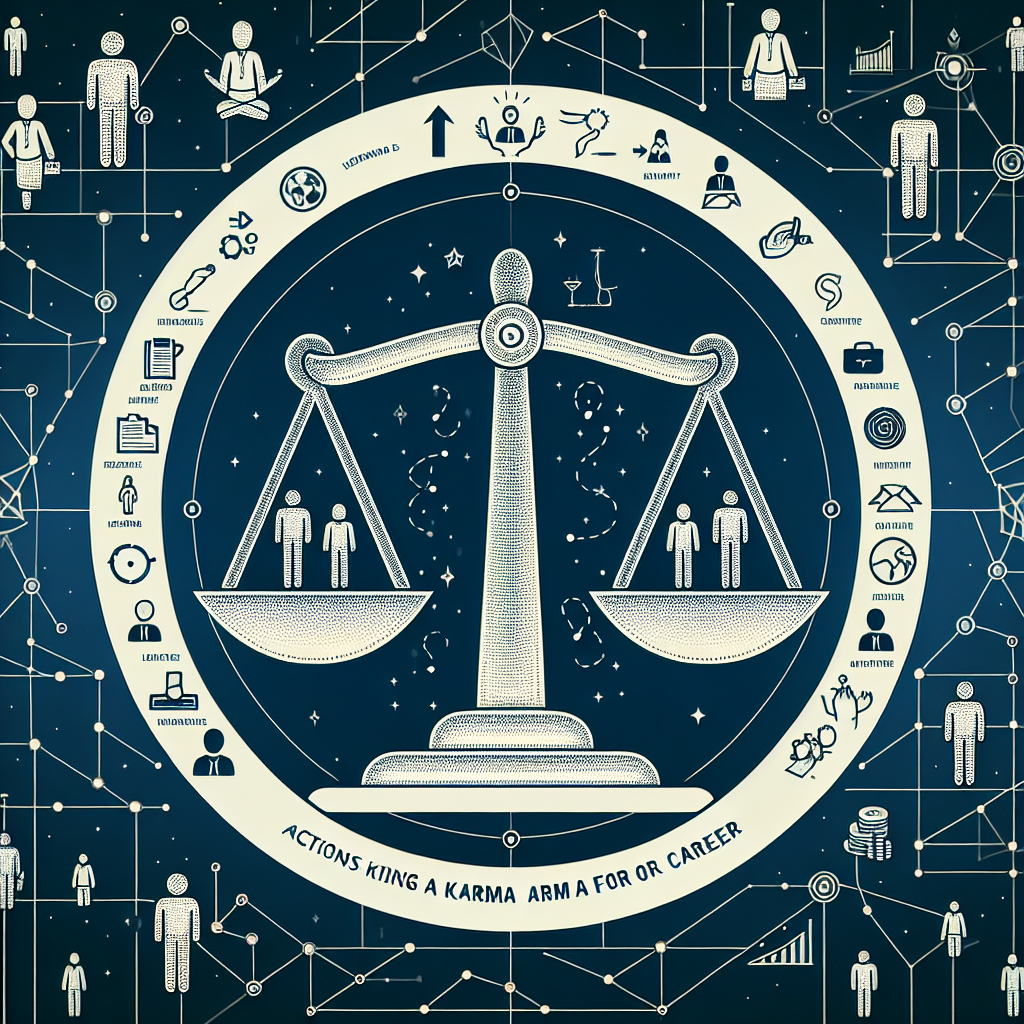Karma is often summarized as “what goes around, comes around.” This Sanskrit term is rooted in philosophical and spiritual teachings, illustrating the relationship between a person’s actions and the consequences that follow. In the context of career development and professional success, this principle becomes particularly significant. Our actions, both good and bad, directly impact our career trajectory, influencing not only our achievements but also our relationships and reputation within our industry.
Understanding Karma
At its core, karma is about accountability and the moral implications of our decisions. It posits that the energy we put into the world, through our actions, thoughts, and intentions, will eventually come back to us. This concept can be applied to various aspects of life, including our careers. By recognizing how our daily actions resonate in our professional lives, we can better navigate our career paths.
The Connection Between Actions and Outcomes
In the workplace, our actions are not isolated incidents; they create a ripple effect that influences our environment, colleagues, and opportunities. Let’s explore the ways in which our actions can shape our professional success.
Building Relationships
Networking is a fundamental aspect of career advancement. Positive actions, such as helping a colleague, providing constructive feedback, or simply being supportive, foster a collaborative atmosphere. These gestures build trust and respect, opening doors to new opportunities and collaborations. On the other hand, negative actions such as gossiping or undermining others can quickly tarnish your reputation, leading to isolation within your profession.
Personal Growth and Development
Your commitment to self-improvement can be seen as a reflection of karmic principles. When you dedicate time to enhance your skills, seek mentorship, and embrace constructive criticism, you’re paving the way for future success. Conversely, if you resist change or reject feedback, you stifle your growth, which might limit your career advancement.
Professional Integrity
Integrity in the workplace is paramount for long-term success. Ethical actions, such as being honest in your dealings, taking responsibility for your mistakes, and adhering to professional standards, establish a solid reputation. Practicing integrity contributes to a positive karmic impression in your career, leading to recognition and trust from peers and superiors alike.
The Role of Positive Actions in Career Advancement
Fostering positive relationships and engaging in supportive behaviors can significantly impact your career growth. Here are ways positive actions contribute to professional success:
- Networking Opportunities: Helping others often leads to reciprocal support. When you invest in your connections, they’re more likely to return the favor, providing opportunities and introductions that can advance your career.
- Reputation Building: A professional known for their integrity and support tends to garner respect. A positive reputation can lead to referrals, promotions, and invitations to exclusive projects or collaborations.
- Mental Health and Workplace Culture: Positive actions contribute to a healthy workplace environment. When you foster positivity, it promotes a culture of collaboration and innovation, ultimately benefiting everyone involved.
- Growth Mindset: Engaging consistently in positive actions fosters a growth mindset, making you more adaptable and open to new challenges. This adaptability is often a key trait sought by employers in potential leaders.
The Impact of Negative Actions on Professional Life
While positive actions can drive success, negative actions can have far-reaching consequences that can hinder your career. Let’s delve deeper into how these actions can shape your professional journey:
- Damage to Relationships: Negative behaviors, such as hostility or insincerity, can erode trust and respect among colleagues. This damage can create barriers that are difficult to mend and limit future collaborative opportunities.
- Career Stagnation: If a professional is known for making unethical decisions, it can lead to limited opportunities. Companies are increasingly prioritizing ethical standards, and individuals with tarnished reputations may find themselves overlooked for promotions or new job opportunities.
- Workplace Culture: Negative actions can lead to toxic workplace environments. This not only affects the morale and productivity of the team but can also lead to high turnover rates, affecting your role and stability in the organization.
- Limited Recognition: Professionals who engage in self-serving behaviors may find it difficult to gain acknowledgment for their hard work. A poor reputation can overshadow accomplishments, resulting in missed job opportunities or promotions.
Integrating Karma Principles into Your Career Strategy
To leverage the principles of karma for career success, one must be proactive. Here’s how you can weave karmic principles into your career strategy:
1. Cultivate Awareness
Awareness of your actions and their potential repercussions is the first step. Regularly reflect on your behavior and its impact on others.
2. Be Intentional
Act with intention. Consider whether your actions contribute positively to your career and the environment around you. Set measurable goals for fostering positive interactions.
3. Embrace Accountability
Own your mistakes and take responsibility for your actions. Accountability not only strengthens your character but can also enhance your reputation.
4. Seek Feedback
Engage with peers and mentors to gain insights on your professional conduct. Constructive criticism can provide invaluable perspectives.
5. Foster Collaboration
Be a team player. Offer assistance and support to colleagues, fostering a spirit of cooperation that amplifies collective success.
6. Practice Gratitude
Recognize and appreciate the efforts and contributions of others. A simple thank you can go a long way in building lasting professional relationships.
Real-Life Examples of Karma in Careers
Examining real-life examples can illuminate how karma manifests in professional settings. Here are a few noteworthy instances:
Positive Case: The Impact of a Mentor
A seasoned professional named Carla took the time to mentor junior colleagues in her industry. She was known for her selflessness and dedication to helping others succeed. As a result, not only did her mentees thrive, but they also actively supported her career by advocating for her during key promotions. Carla’s actions of giving back to the community created a network of professionals who appreciated her and sought to help her flourish.
Negative Case: Reputation Damage
In contrast, a young manager, Tom, engaged in underhanded tactics to outshine his colleagues. While he initially experienced rapid success, his deceptive practices came to light, damaging his relationships and reputation. The negative karma associated with his actions ultimately led to his downfall, as he was passed over for advancement opportunities and, over time, left the company with a tarnished image.
Conclusion
The interplay between karma and career success is a profound reminder of how our actions, words, and intentions significantly shape our professional journeys. Positive actions create a ripple effect that fosters trust, collaboration, and opportunity, while negative actions can lead to isolation and career stagnation. By cultivating awareness and intentionality in our professional conduct, we can navigate our careers effectively, ensuring that what we put into the world returns to us in kind. As we move forward in our professional endeavors, let us remember that the energy we emit has the power to influence our careers and the lives of those around us.
FAQs
What is karma in the context of a career?
Karma in a career context refers to the idea that the actions you take, whether positive or negative, will eventually come back to influence your professional life. This encompasses how you treat colleagues, the ethics you uphold, and the character you display in your work environment.
How can I apply karmic principles in the workplace?
You can apply karmic principles by cultivating positive relationships, being accountable for your actions, embracing a collaborative mindset, and constantly seeking personal growth. Reflecting on your actions and understanding their potential impact is crucial to this process.
Can negative actions affect my career long-term?
Yes, negative actions can have long-lasting effects on your career. They can damage your reputation, hinder relationships with colleagues, and limit opportunities for advancement. Maintaining a positive demeanor is essential for sustaining career growth.
Is it too late to change the course of my professional life?
It’s never too late to make a positive change in your professional life. Acknowledging past behaviors and making a conscious effort to improve can help restore relationships and rebuild your reputation over time.
How can I measure the impact of my actions on my career?
You can measure the impact of your actions by seeking feedback from peers, assessing your professional relationships, evaluating your career progress, and reflecting on how others respond to your behavior. Regular self-assessment and openness to constructive feedback are valuable practices.
It seems like you’ve mentioned “Prompt,” but I need a little more detail to help you effectively. Are you looking for a writing prompt, an idea for a project, or something else? Please provide more context!, #Karma #Career #Actions #Shape #Professional #Success, #Karma #Career #Actions #Shape #Professional #Success, 1734477471, karma-and-career-how-your-actions-shape-professional-success





